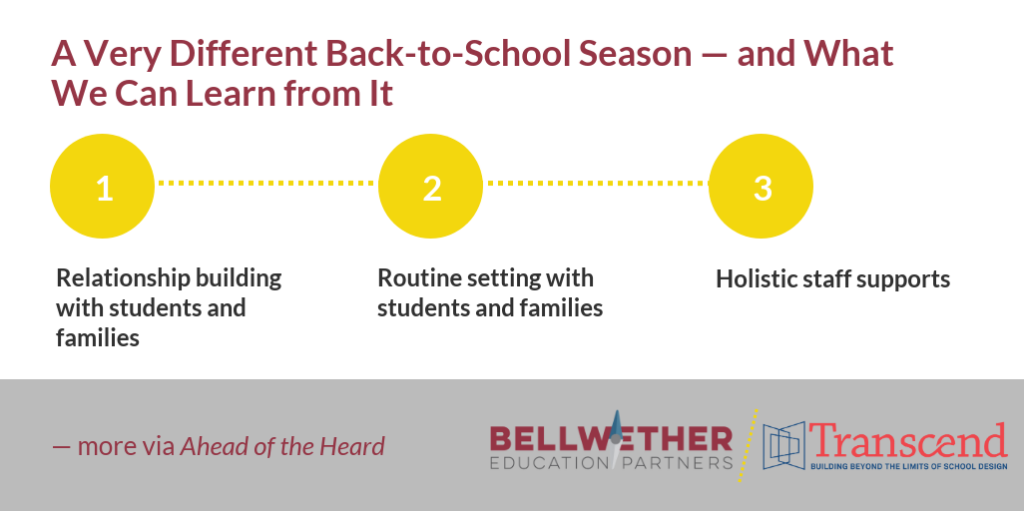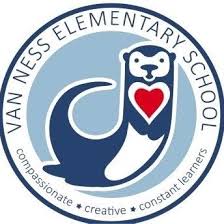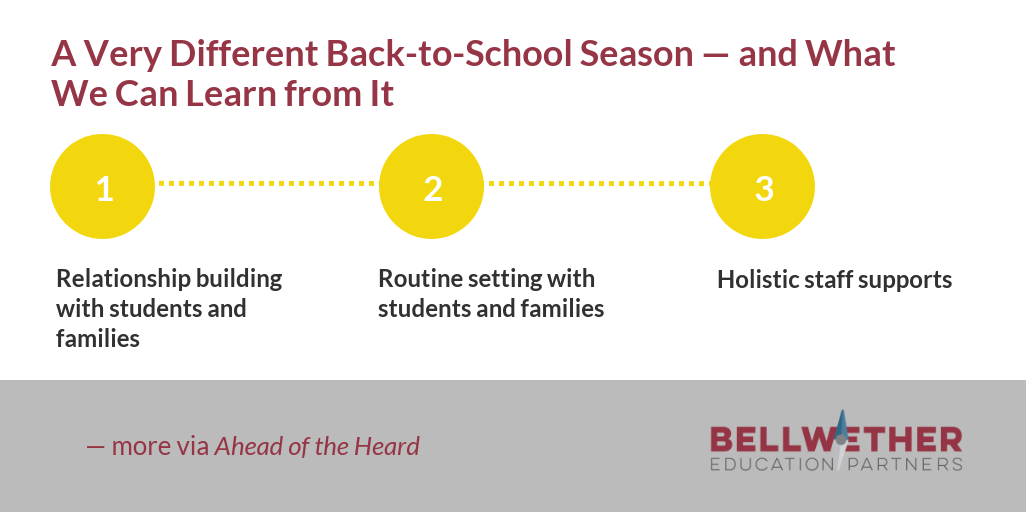This post was co-authored with Jenee Henry Wood of Transcend, a national nonprofit working with communities to build and spread extraordinary, equitable learning environments.

As anyone in education knows, the first few weeks of school are absolutely critical. The relationships, routines, and community established in those early days serve as a foundation for the rest of the year. We also know that this year, most of America’s school communities had a dramatically different type of start.
Over the summer, in response to the unprecedented challenges leaders and schools were facing due to the coronavirus pandemic, the teams of Transcend and Bellwether began brainstorming opportunities to combine our respective organizations’ expertise and resources (see, for example, Bellwether’s COVID resource page and Transcend’s COVID resource Library).
In this blog post, our two organizations share insights from our experiences working closely with schools on how three common back-to-school priorities (relationship-building, routine creation, and teacher supports) have looked for their school-based partners during the COVID-19 crisis, and consider how these real-time innovations might help us rethink the way we do things in school moving forward.
Here are more details on these three priorities, with concrete examples and lessons for the future:
Relationship building with students and families
Students need to feel known and seen before they can learn effectively. Because of this, relationship building has always been a priority for the first several weeks of school.
How it looks during COVID-19
- One-on-one meet ups with students outside of the building or via Zoom
- Facilitated e-intros between last year’s teacher and this year’s
- “Looping” with the same students from one year to the next (i.e. teachers stick with the same students they had last year)
- Every student receives regular, one-on-one touchpoints from an assigned staff member
- Targeted outreach to students who miss class to troubleshoot barriers early on
- Virtual, daily student advisories (adult-facilitated small groups for students)
Exemplar from the field
Statesman College Prep Academy for Boys in Washington, D.C, is ensuring no student falls through the cracks by using daily 1:1 check-ins with students and families to build relationships, support well-being, and foster engagement in virtual learning.
Considerations for the future
Is relationship-building in schools too confined by traditional structures like the academic calendar year, grade bands, and staff organizational charts? Moving forward, how might we move past these constraints to make sure every student feels supported by a trusted adult at school?
Routine setting with students and families
The first six weeks of school are essential for establishing schedules, routines, and procedures that help classrooms run efficiently and effectively throughout the year.
How it looks during COVID-19
- Increased student agency to determine routines around when, where, and how to learn
- User-friendly, visual schedules to orient students and families to expectations
- Pre-recorded videos of how to use online platforms, submit work, etc.
- Regular office hours to troubleshoot/answer questions
- Daily morning and end-of-day emails to students and families sharing all relevant links and assignments from the day’s lessons
- Differentiated expectations (i.e. multiple schedules, flexible timelines for work completion) based on family and student needs
Exemplar from the field
 Van Ness Elementary, a DC Public School and an exemplar in integrating social-emotional learning, has seen great success in translating many of its practices into a virtual setting. Van Ness’ Strong Start Rituals and their First Weeks of School Virtual Learning tools can readily be adopted by teachers.
Van Ness Elementary, a DC Public School and an exemplar in integrating social-emotional learning, has seen great success in translating many of its practices into a virtual setting. Van Ness’ Strong Start Rituals and their First Weeks of School Virtual Learning tools can readily be adopted by teachers.
Considerations for the future
To what extent are our traditional routines and expectations designed for compliance rather than the creation of a strong learning community? Moving forward, how might we reimagine routines and expectation-settings to be more student-centered, inclusive of families, and differentiated by need?
Holistic staff supports
Teachers and staff (like employees everywhere) must feel supported as people and professionals in order to perform at the highest level and meet the diverse needs of young people. In the current context, even more attention must be paid to supporting adults who are dealing with added stress and trauma and are working under entirely new job expectations and conditions.
How it looks during COVID-19
- Connections to peer counseling and advising for staff, as needed
- Small-group adult mindfulness activities
- Professional development that is responsive to teachers’ real-time needs, and which often utilizes teachers with in-house expertise as leaders
- A bank of rotating “off time” to provide days off for rest and recovery
- Differentiated staff schedules and expectations to accommodate demands of personal life during a pandemic
- Innovative staffing models that allow for increased efficiency and specialization
Exemplar from the field
Pop Consulting has partnered with Transcend to put out a Trauma & Recovery Series designed to support teachers holistically.
Considerations for the future
Where are there opportunities to rethink teacher roles to increase flexibility, autonomy, and innovation? Moving forward, how might we structure supports that create space for sustainability and self care and allow teachers to be the best professionals they can be?
– – –
The innovations we have observed during this unusual back-to-school season are both inspiring and a call to action. As school leaders and teachers continue to navigate this ongoing crisis, it is imperative that the broader field find ways to create the time, space, and resources for these practitioners to capture lessons learned and consider what those lessons might mean for the future of school.
During this pandemic, the Bellwether and Transcend teams have partnered to bring the best expertise of our two organizations to support leaders thinking about school differently. If you are interested in supporting further collaboration between our organizations, please email Tresha Ward (tresha.ward@bellwether.org) and Jeff Wetzler (jeff@transcendeducation.org).
